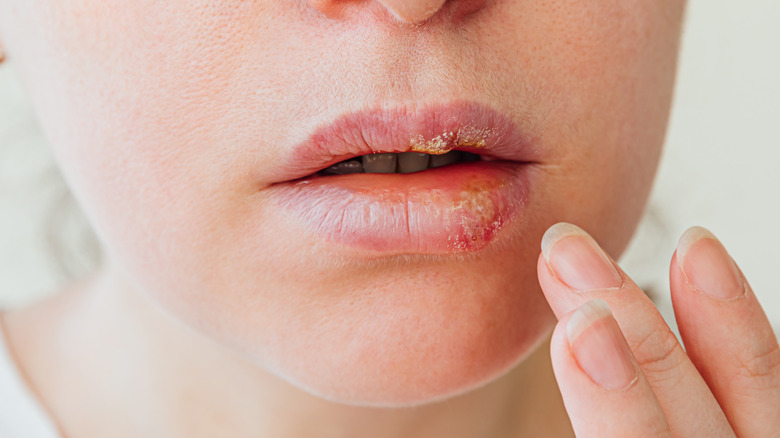How Herpes Can Present Differently In Men Versus Women
Herpes is an infectious disease caused by a virus known as herpes simplex virus (via Medical News Today). The viral infection either affects the genitals or the mouth. According to the Centers for Disease Control and Prevention (CDC), herpes is a sexually transmitted disease (STD) in the U.S., affecting more than 570,000 people a year. It attacks people of all ages, but mostly those who are around 14 to 49 years or individuals who are sexually active. Most of the time it's passed on through physical contact since it's a contagious condition (per Healthline). In fact, you might catch it by coming in close contact with bodily fluids or sores. Children could also get herpes if they're kissed by an infected person.
Genital herpes is comparatively more frequent than oral herpes, as per CDC. However, herpes affects a larger population of women than men, primarily because the herpes infection is easier to pass through penile-vaginal intercourse. But how much more different is the condition between men and women? Here's what we know.
How herpes varies in men and women
The symptoms of herpes vary slightly in both genders. According to Medical News Today, genital herpes in men affects the groin, scrotum, anus, and penis. It's also possible that the affected individual might not be aware of the infection, as it has the tendency to stay dormant for a while. Infected men may have tingling in the butt, thighs, and genital region. They may also experience difficulty peeing. Some can notice blisters around the penis. If they have genital herpes, there may be swelling around the groin, whereas oral herpes may cause swelling in the teeth or gums.
Similarly in women, there's a chance that the infection could stay hidden and not display any visible symptoms in the beginning (via the U.S. Department of Veterans Affairs). Women with herpes might experience discomfort just below the stomach, painful blisters, or cold sores around or inside the vagina, anus, mouth, or pelvic region. Moreover, there may be some abnormal vaginal discharge along with pain in the genital region, legs, or thighs. Persistent fever along with headaches are also common symptoms of herpes in women. All in all, there is no cure for herpes (via Medical News Today). But through proper medication and preventive measures, it's possible to manage and eradicate the symptoms gradually.


